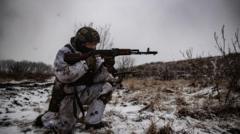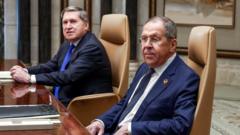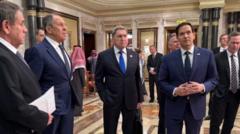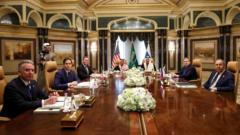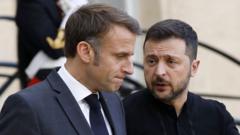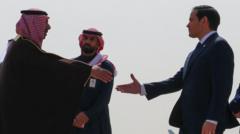The upcoming peace negotiations concerning Ukraine's future are under intense scrutiny as multiple entities—including Ukraine, Russia, and Western allies—express divergent goals. Key points of contention include territorial integrity, NATO membership, and the necessary security guarantees.
Perspectives on Peace: Unpacking the Competing Visions for Ukraine's Future

Perspectives on Peace: Unpacking the Competing Visions for Ukraine's Future
As the Munich Security Conference sets the stage for potential peace talks, various stakeholders outline their contrasting objectives regarding Ukraine’s sovereignty and security.
In recent discussions ahead of the Munich Security Conference (MSC), the fate of Ukraine is at the forefront, especially following a significant phone call between U.S. President Donald Trump and Russian President Vladimir Putin, in which both expressed willingness to negotiate an end to the ongoing conflict. Trump characterized the call as "great," emphasizing the potential for reaching a conclusion to what he termed a "bloody war." Meanwhile, Ukrainian President Volodymyr Zelensky has asserted that Ukraine must be an integral part of any dialogue seeking peace.
European leaders have been quick to react, with French President Emmanuel Macron cautioning that any deal perceived as capitulation to Russia would have dire repercussions for all parties involved. Key discussions in potential negotiations could revolve around territorial disputes, security arrangements, and Ukraine's aspirations regarding NATO membership.
Russia currently claims over 20% of Ukrainian territory, including regions annexed since 2014 following the ousting of Ukraine's pro-Russian leader. Despite its military setbacks, Russia maintains control over Crimea, Donetsk, and Luhansk, and has proposed these areas be recognized as part of Russia. In contrast, Zelensky adamantly insists that any peace accord must entail the complete withdrawal of Russian forces back to pre-2014 borders.
In a surprising twist, Zelensky proposed a territory exchange: land held by Russia could be swapped for Ukraine-controlled areas in Russia’s western Kursk region, though the Kremlin quickly dismissed this suggestion. Western allies have historically supported Ukraine's claims to regain all occupied territories, yet U.S. Defense Secretary Pete Hegseth recently expressed that pushing for a complete return to pre-2014 borders could prolong the conflict unnecessarily.
The prospect of Ukraine joining NATO is another critical issue, with Kyiv arguing that NATO membership would provide essential security assurances amid ongoing hostilities. However, Russia vehemently opposes this potential accession, viewing it as a direct threat. Ukrainian leadership, including Zelensky, has contended that NATO's collective defense pacts are vital for ensuring national safety, while some Western officials have started to downplay the feasibility of NATO membership being part of a negotiated settlement.
Security guarantees remain another focal point. Zelensky has voiced skepticism that any promises made without U.S. backing would be effective. Previous talks with Trump, he believes, lacked substance necessary for a long-term resolution. Democratic officials have indicated that the U.S. could offer potential air defense assistance to Ukraine if a peacekeeping arrangement were established.
As the world watches the developments closely, it remains uncertain how these contrasting visions for peace will play out in future negotiations, with global implications for stability in the region and beyond.
European leaders have been quick to react, with French President Emmanuel Macron cautioning that any deal perceived as capitulation to Russia would have dire repercussions for all parties involved. Key discussions in potential negotiations could revolve around territorial disputes, security arrangements, and Ukraine's aspirations regarding NATO membership.
Russia currently claims over 20% of Ukrainian territory, including regions annexed since 2014 following the ousting of Ukraine's pro-Russian leader. Despite its military setbacks, Russia maintains control over Crimea, Donetsk, and Luhansk, and has proposed these areas be recognized as part of Russia. In contrast, Zelensky adamantly insists that any peace accord must entail the complete withdrawal of Russian forces back to pre-2014 borders.
In a surprising twist, Zelensky proposed a territory exchange: land held by Russia could be swapped for Ukraine-controlled areas in Russia’s western Kursk region, though the Kremlin quickly dismissed this suggestion. Western allies have historically supported Ukraine's claims to regain all occupied territories, yet U.S. Defense Secretary Pete Hegseth recently expressed that pushing for a complete return to pre-2014 borders could prolong the conflict unnecessarily.
The prospect of Ukraine joining NATO is another critical issue, with Kyiv arguing that NATO membership would provide essential security assurances amid ongoing hostilities. However, Russia vehemently opposes this potential accession, viewing it as a direct threat. Ukrainian leadership, including Zelensky, has contended that NATO's collective defense pacts are vital for ensuring national safety, while some Western officials have started to downplay the feasibility of NATO membership being part of a negotiated settlement.
Security guarantees remain another focal point. Zelensky has voiced skepticism that any promises made without U.S. backing would be effective. Previous talks with Trump, he believes, lacked substance necessary for a long-term resolution. Democratic officials have indicated that the U.S. could offer potential air defense assistance to Ukraine if a peacekeeping arrangement were established.
As the world watches the developments closely, it remains uncertain how these contrasting visions for peace will play out in future negotiations, with global implications for stability in the region and beyond.


